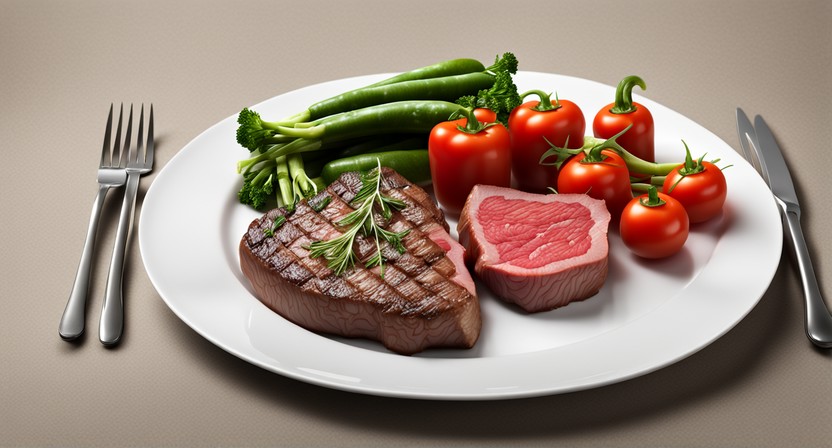Getting Enough Protein Without Dairy
Can you meet your protein needs without dairy? Discover delicious and nutritious alternatives in this dairy-free protein guide. Check if dairy free is healthy.

Picture this: an easy and enjoyable lifestyle change that allows you to outdo your protein intake expectations - without touching a single dairy product. Whether you're living a dairy-free life due to health concerns, allergies, or consciously supporting the environment, we're here to reassure you. You can still meet your body's needs for vital proteins, and yes, it can be a breeze.
Journeying Beyond Dairy
Dairy has often been the go-to source of protein for many, but we invite you today to explore a world teeming with protein-rich alternatives. Believe it or not, protein isn’t just about dairy or meat. Nature itself is abundant with varied foods that nourish us with the desired protein punch sans any dairy.
The Champions of the Plant World
Plant-based proteins, despite popular belief, are nutrient-packed warriors that are ready to take charge of your well-being. From seeds and lentils to vegetables and grains, these protein heroes will ensure you're never left yearning for protein.
Beans & Lentils
Beans and lentils are a treasure trove of protein. Consider chickpeas, black beans, or lentils for your next meal. They're versatile, tasty and can be incorporated into various dishes—whether that's a spicy chickpea curry, a dreamy black bean soup or a hearty lentil stew.
Grains
Whole grains like quinoa, brown rice and oats are protein powerhouses and fantastic add-ons to your dairy-free diet. A bowl of warm oatmeal for breakfast, a vibrant quinoa salad for lunch and a comforting plate of brown rice with veggies for dinner - and voila! Your protein content for the day is secure.
Seeds & Nuts
Whoever said that small things pack a punch must have been talking about seeds and nuts. Pumpkin seeds, flax seeds, almonds, and peanuts - these small yet potent sources are brimming with protein and can be easily incorporated in your diet. You can add them to your salads, cereals, or even enjoy them as snacks.
The Meaty Affair
If you're open to meat, fish, and eggs, your protein-rich choices simply expand. Lean meats, fish like salmon and eggs are filled with protein and are reliable, dairy-free options. They can effortlessly become the centerpiece of your meals, or shine as the sidekicks everyone appreciates.
Building Your Protein Fortress
Creating a well-balanced, protein-filled diet plan may seem challenging, but with a little understanding of what foods to opt for, it becomes an exciting culinary journey.
Start by including a variety of protein sources in your meals. This not only helps with meeting your protein requirements but also introduces you to different flavors and textures.
Plan your meals smartly. For breakfast, include protein powerhouses like oats, seeds or eggs. Your lunch could feature a balanced mix of whole grains and lentils or a hearty piece of salmon. Complete the day with a luscious dinner featuring beans or a lean cut of meat. Snacks? Reach out for a handful of nuts.
Don’t forget, proteins are abundant in a vast array of natural foods. By consciously choosing these wholesome sources, you’re inviting health into your life, without compromising deliciousness.
Cherishing the Journey
Remember, your path to a dairy-free, protein-rich diet isn’t about replacement – it’s about discovery. It’s about exploring new choices, experimenting with flavors and textures, and most importantly, treating your body to a wholesome, nutritious diet.
Behind every meal lies a chance to do something fantastic for your health. Each time you add a scoop of quinoa onto your plate, or mix a handful of nuts into your salad, visualize the power that this protein-packed food is giving you. Every step you take on this journey not only brings you closer to achieving your protein goals but also fosters a healthful and balanced life.
Welcome to a world where proteins abound in every corner, where the simple act of eating becomes a path to fuel your wellness. Here’s to celebrating life with an abundance of health and vigor, dairy-free and protein-rich. Take a bite, take a step, and savor each moment of this journey to redefining your relationship with food. Embrace the change and know that you're doing an outstanding service to yourself and your health.
Embrace the flavors, embrace the spontaneity. Here's to a healthier, happier, protein-empowered you!
The Unseen Challenges of a Dairy-Free Diet
While a dairy-free diet can offer numerous benefits and alternative sources of protein, it's important to consider some potential downsides. One of the most significant concerns is the potential for nutrient deficiencies. Dairy products are not just about protein; they are also rich sources of calcium, vitamin D, and other essential nutrients. Eliminating dairy can inadvertently lead to reduced intake of these vital nutrients, potentially impacting bone health and overall wellness.
Another aspect often overlooked is the challenge of finding equally nutritious and complete protein sources. While plant-based proteins are excellent, most are not 'complete' proteins, meaning they don't contain all the essential amino acids the body needs. This can be particularly concerning for individuals with high protein requirements, such as athletes or those with specific health conditions. Relying solely on plant-based proteins may require a more meticulous approach to meal planning to ensure all amino acids are adequately consumed.
Furthermore, the social and cultural aspects of a dairy-free diet can pose challenges. Dairy products are deeply embedded in many cuisines and social traditions, making it difficult for individuals on a dairy-free diet to participate fully in social gatherings and cultural rituals. This can lead to a sense of exclusion or require additional effort to find suitable alternatives. While the health benefits of a dairy-free diet are clear, it's important to be mindful of these challenges and address them proactively.